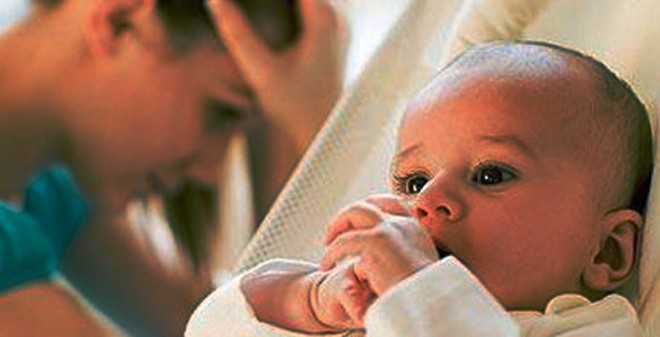

Mariam had a baby after three years of her marriage. She had a happy, healthy pregnancy pathologically. But the constant stress from the in-laws to have a son and isolation from her husband (who worked abroad) deprived her from being emotionally driven. As soon as she bore the labour pains to deliver the baby safely, she started having crying sessions; despite her fervour to enjoy the phase of newly motherhood, she could not build a relationship with her son. She started feeling guilty.
Mariam was fortunate to have a timely treatment to shake off her guilt of being a terrible mother. Her psychiatrist, Farah Tiwana, a clinical psychologist at Fatima Memorial Hospital, distinguished her mood swings, crying jags and unenthused behaviour as the symptoms of the postpartum depression (PPD).
"Mental disorders can afflict new moms," Farah told, "The emotional surges are believed to be the natural effect of hormonal shift that occur during pregnancy and childbirth. Though how worse it can be depends on the combination of biological, environmental and situational factors."
Various researches found that economic status, family structure and education had no impact influencing the causes of PPD. In fact, factors like family history, stressful events, bipolar depression and a traumatic delivery are basic bullets pressurising the mental health after the childbirth.
PPD can have severe repercussions on the health of both the baby and the mother. Very few know about the onset of depressive symptoms that set in a few weeks following the delivery of the child. These symptoms include crying spells, irritability, sad or hopeless, feeling down, changes in eating habits, exhaustion from lack of sleep, questioning yourself as a mother and partner, difficult to focus, feeling unsure of yourself in general, feeling guilt or shame, worry about being alone with your child or having thoughts of hurting yourself or your child. "Famous actresses in the west have surpassed the barriers of stigma by sharing their own personal experiences of taking the role of mother with difficulty. Here in our society there is an immense resentment to even think about analysing your mental health," Amna Munir, a clinical psychologist, at Iqra Medical Complex explained.
Most studies are rendered with the help of self reporting and estimate as many cases remain unreported. In a campaign organised by Elaj Trust to highlight the severity of postpartum depression, it is reported that the PPD has a prevalence rate ranging from 28-63 per cent in Pakistan, placing it among the highest in Asia.
Like other mental illnesses, the PPD has also failed to be recognised as one medical condition that has a proper treatment with the practitioners in Pakistan. "It is very unfortunate that a large number of new mothers suffering from the symptoms of PPD cannot express their state of agony with their family members even not with their husbands due to our cultural perplexities. They are afraid of being misunderstood as insane or incapable," Amina said.
Our culture continues to perpetuate the idea of marrying the girls at an early age, who are still young to handle the responsibility of the motherhood "Most of the patients that we witness are the young ladies who are failing to cope with the challenges of the new phase in their lives-the joy of motherhood comes along sleepless nights, changing diapers and breastfeeding," Farah noted.
"People around us should understand that no doubt being a mother is an ultimate bliss but it can be bit overwhelming. It is already very hard to cope with the hormonal changes which heavily influences our mood, then we have a little angel in our hands, and those snippets of advices of what to do and not to do," Sarah Rafi, mother of two, a working paediatrician shared her experience. "These advices are often from the untrained and uneducated women around who even does not realise the real problem, but we are left in the state of bewilderment as if we are actually incompetent."
All women are not alike; not everyone can immediately adapt to the role of the perfect mother. "In this regard, husbands have a momentous role to support the battling of the tough time; its new phase for both so they should enjoy and face it together," Sarah added. "It is worth noting that Finland’s family benefits where fathers and mothers both can have parental leave period which is actually very supportive for the healthy beginning."